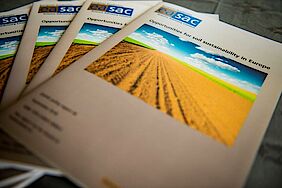Current Projects
Sustainability of Europe's Soils
The pressures on maintaining the sustainability of Europe's soils and their ability to meet targets of food production, biodiversity, maintenance or increasing soil carbon content and other issues were addressed in a project led by the Royal Netherlands Academy of Arts and Sciences (KNAW). This produced a detailed analysis of current issues and opportunities in delivering sustainability of Europe's soils, which was released in September 2018.
The report examines the threats to the sustainability of soils, the potential contribution to worsening or mitigating climate change, the importance of soil biodiversity, and interactions between soil health and human health. In particularly the report looked at the policy measures necessary to secure the capacity of soils to deliver goods and services in a rapidly changing world, and provide scientific guidance on how to support policy on sustainable and multifunctional soil management. Among its policy-relevant findings were:
- international attention to soils has been rising, and Europe should be part of this
- soil biodiversity underpins the provision of key ecosystem services which support above-ground biodiversity and productivity
- there is a conflict between short-term pressures to produce high yields in agriculture, and long-term sustainability of the soil; this should be addressed in the next Common Agricultural Policy revision
- High-yielding crops contain lower concentrations of micronutrients which affects their contribution to a healthy diet.
- The growing use of human and animal antibiotics and other medicines raises concerns about their effects on soil biodiversity and the development of new forms of antibiotic resistance
- Soils play a key role in climate regulation and their importance is recognised in the ‘4 per mille’ initiative, which offers many beneficial side effects and should be supported. It is important to avoid large losses of soil carbon through continued unsustainable use of peat soils or degrading wetlands. Protection and restoration of peatlands is critical to maintaining and increasing soil organic carbon in the EU.
- Loss of agricultural land through soil sealing increases the demand for agricultural imports which drives deforestation in countries exporting to the EU. Strategies for reducing demands on soil sealing (and other forms of land taking for mining, etc.) need to be applied.






























